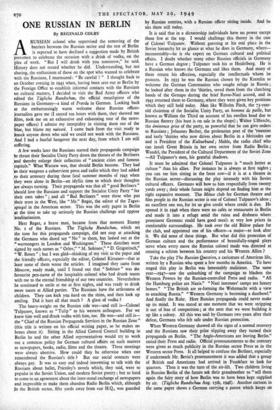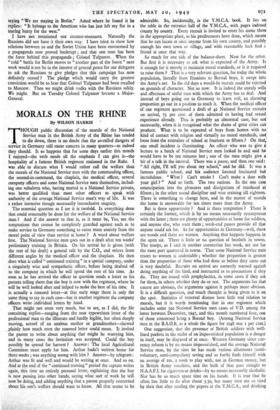ONE RUSSIAN IN BERLIN
By REGINALD COLBY
RUSSIAN colonel who supervised the removing of the barriers between the Russian sector and the rest of Berlin is reported to have declined a suggestion made by British pressmen to celebrate the occasion with a drink of vodka, on the plea of work. "But I will drink with you tomorrow," he said. History does not record whether he did. Understanding, but not sharing, the enthusiasm of those on the spot who wanted to celebrate with the Russians, I murmured: "Be careful ! " I thought back to an October evening in 1945 when, having been sent out to Berlin by the Foreign Office to establish informal contacts with the Russians on cultural matters, I decided to visit the Red Army officers who edited the Thgliche Rundschau, the official mouthpiece of the Russians in Germany—a kind of Pravda in German. Looking back at the embarrassingly warm welcome these Russian officer- journalists gave me (I stayed ten hours with them, they showed me 6lins, took me on an exhaustive and exhausting tour of the news- paper offices) I admire my intrepidity in visiting them out of the blue, but blame my naivete. I came back from the visit ready to knock anyone down who said we could not work with the Russians. And I had a fearful hangover the next day, from which I am still suffering.
A few weeks later the Russians started their propaganda campaign to thrust their Socialist Unity Party down the throats of the Berliners :an d thereby enlarge their collection of "ancient cities and famous capitals." What Warsaw was, that should Berlin become. They had las their weapons a subservient press and radio which they had added to their armoury during those fatal summer months of 1945 when they were alone in Berlin—an idyllic time to which their thoughts are always turning. Their propaganda was that all "good Berliners" 'should love the Russians and support the Socialist Unity Party "for 'their own sakes " ; and all "Bad Berliners" were those who put their trust in the West, like "Mr." Reger, the editor of the Tages- ,spiegel in the American sector. This was the only paper in Berlin at the time to take up seriously the Russian challenge and oppose totalitarianism.
Herr Reger, a brave man, became from that moment Enemy No. r of the Russians. The Tiigliche Rundschau, which set the tone for this propaganda campaign, did not stop at attacking the Germans who dared say " No " to them, but lashed out at the " warmongers in London and Washington." These diatribes were signed by such names as " Orlov," "M. Sobinov," "D. Grigoritsch," "W. Rosen" ; but I was glad—thinking of my visit to the paper and the friendly officers, especially the editor, Colonel Kirsanov—that at least none of them wrote the articles. I imagined they came from Moscow, ready made, until I found out that " Sobinov " was the favourite pen-name of the hospitable colonel who had drunk toasts with me to the eternal friendship of our two countries. Nevertheless he continued to smile at me at first nights, and was ready to drink more toasts at Allied parties. The Russians have the artlessness of children. They can kick you hard on the shins, and then look up smiling. Did it hurt all that much ? A glass of vodka ?
The heavy-weight on the Russian side was—and still is—Colonel Tulpanov, known as " Tulip " to his western colleagues. For we knew him well and drank vodka with him, too. He was—and still is— the "Chief of the Russian Propaganda Services in the Russian Zone" (this title is written on his official writing paper, so he makes no bones about it). Sitting in the Allied Control Council building in Berlin he and the other Allied representatives would try to work out a common policy for German cultural affairs on such matters as newspapers, books, radio, films and the theatre. These meetings were always abortive. How could they be otherwise when one remembered the Russian's title ? But our social contacts were always gay. It was so easy and indeed interesting to talk with the Russians about ballet, Priestley's novels which, they said, were so popular in the Soviet Union, and modern Soviet poetry ; but so hard to come to an agreement about the inter-zonal exchange of newspapers and impossible to make them abandon Radio Berlin which, although jrt the British sector, fifty yards away from our H.Q., was guarded
by Russian sentries, with a Russian officer sitting inside. And he sits there still today.
It is said that in a dictatorship individuals have no power except those few at the top. I would challenge this theory in the case of Colonel Tulpanov. Without guessing at his real place in the Soviet hierarchy let us glance at what he does in Germany, where- incontestably—he is the expert on German cultural and political affairs. I doubt whether many other Russian officials in Germany have a German degree ; Tulpanov took his at Heidelberg. He is a Russian who knows the Germans and likes them. And many ot them return his affection, especially the intellectuals whom he protects. In 1933 he was the Russian chosen by the Kremlin to welcome the German Communists who sought refuge in Russia ; he looked after them in the 'thirties, saved them from the clutching hands of the Gestapo during the brief Russo-Nazi accord, and in 1945 returned them to Germany, where they were given key positions which they still hold today. Men like Wilhelm Pieck, the 73-year- old chairman of the Socialist Unity Party, an homme de paille, but known as William the Third on account of his swollen head due to Russian flattery (his bust is on sale in the shops) ; Walter Ullbricht, the eminence grise of the party, so powerful that he can give orders to Russians ; Johannes Becher, the proletarian poet of the 'twenties and early 'thirties who now drives about Berlin in a Mercedes car and is President of the Kulturbund ; Mahle, the radio chief who can insult Great Britain in her own sector from Radio Berlin ; Wandel, the President of the Cultural Department of the Soviet Zone —All Tulpanov's men, his grateful shadows.
It must be admitted that Colonel Tulpanov is "much better at culture" than his allies. For instance he is always at first nights ; you can see him sitting in the front row—if it is at a theatre in the Russian sector—discussing the play intensely with his Soviet cultural officers. Germans will bow to him respectfully from twenty yards away ; their whole future might depend on finding him at the right expansive moment. The Mowe club for German theatre and film people in the Russian sector is one of Colonel Tulpanov's ideas ; an excellent one too, for let us give credit where credit is due. He opened it in 1946 when there were no cafés or restaurants in Berlin and made it into a refuge amid the ruins and drabness where prominent Germans could have good- meals at very low prices in comfortable surroundings. He took over the old Billow palace for the club, and appointed one of his officers—a major—to look after it. We did none of these things. But what did this protection of German culture and the performance of beautifully-staged plays serve when every move the Russian colonel made was directed at creating a schism between his country and his Western Allies ?
Take the play The Russian Question, a caricature of American life, written by a Russian who spent a few months in America. To have staged this play in Berlin was lamentably malicious. The same year—I947—saw the unleashing of the campaign to blacken the Western Powers by the Russian-controlled Press and radio. "All the Hamburg police are Nazis." "Nazi internees' camps are luxury homes." "The British are re-forming the Wehrmacht with a view to attacking Russia." "Western Germany is becoming a dustbowl." And finally the Ruhr. Here Russian propaganda could never make up its mind. It was stated at one moment that we were stripping it out of fear of competition ; at the next that we were building it up like a colony. All this was said by Germans two years after their defeat, Germans who felt safe under Russian protection.
When Western Germany showed all the signs of a normal recovery and the Russians saw their prize slipping away they turned their propaganda on Berlin. "The Anglo-Americans are leaving Berlin." stated their Press and radio. Official pronouncements to the contrary were given as much publicity in the Russian sector Press as in the Western sector Press. It all helped to confuse the Berliner, especially if underneath Mr. Bevin's pronouncetnent it was added that a group of British and Americans had arrived in Frankfurt to look for quarters. Then it was the turn of the air-lift. Two children living in Russian Berlin of the future ask their grandmother to "tell them again the fairy story of how Berlin was to have been kept supplied by air. (Tiigliche Rundschau Aug. 15th, 1948).( Another cartoon in the same paper shows a German carrying a parrot which keeps on saying "We are staying in Berlin." Asked where he found it he replies: "It belongs to the American who has just left my flat in a tearing hurry for the west."
I have not mentioned our counter-measures. Naturally the Russians did not have it their own way. I have tried to show how relations between us and the Soviet Union have been envenomed by a propaganda now proved bankrupt ; and that one man has been the force behind this propaganda ; Colonel Tulpanov. When the " cold " battle for Berlin moves to "another part of the forest" next week would it not be in the interest of general peace for our delegates to ask the Russians to give pledges that this campaign has now definitely ceased ? The pledge which would carry the greatest conviction would be to hear that Colonel Tulpanov had been recalled to Moscow. Then we might drink vodka with the Russians safely. We might. But on Tuesday Colonel Tulpanov became a Major- General.











































 Previous page
Previous page